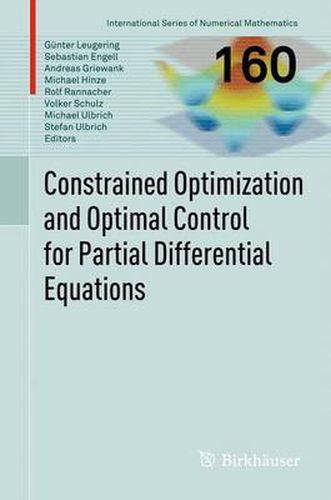Readings Newsletter
Become a Readings Member to make your shopping experience even easier.
Sign in or sign up for free!
You’re not far away from qualifying for FREE standard shipping within Australia
You’ve qualified for FREE standard shipping within Australia
The cart is loading…






This title is printed to order. This book may have been self-published. If so, we cannot guarantee the quality of the content. In the main most books will have gone through the editing process however some may not. We therefore suggest that you be aware of this before ordering this book. If in doubt check either the author or publisher’s details as we are unable to accept any returns unless they are faulty. Please contact us if you have any questions.
This special volume focuses on optimization and control of processes governed by partial differential equations. The contributors are mostly participants of the DFG-priority program 1253: Optimization with PDE-constraints which is active since 2006. The book is organized in sections which cover almost the entire spectrum of modern research in this emerging field. Indeed, even though the field of optimal control and optimization for PDE-constrained problems has undergone a dramatic increase of interest during the last four decades, a full theory for nonlinear problems is still lacking. The contributions of this volume, some of which have the character of survey articles, therefore, aim at creating and developing further new ideas for optimization, control and corresponding numerical simulations of systems of possibly coupled nonlinear partial differential equations. The research conducted within this unique network of groups in more than fifteen German universities focuses on novel methods of optimization, control and identification for problems in infinite-dimensional spaces, shape and topology problems, model reduction and adaptivity, discretization concepts and important applications. Besides the theoretical interest, the most prominent question is about the effectiveness of model-based numerical optimization methods for PDEs versus a black-box approach that uses existing codes, often heuristic-based, for optimization.
$9.00 standard shipping within Australia
FREE standard shipping within Australia for orders over $100.00
Express & International shipping calculated at checkout
This title is printed to order. This book may have been self-published. If so, we cannot guarantee the quality of the content. In the main most books will have gone through the editing process however some may not. We therefore suggest that you be aware of this before ordering this book. If in doubt check either the author or publisher’s details as we are unable to accept any returns unless they are faulty. Please contact us if you have any questions.
This special volume focuses on optimization and control of processes governed by partial differential equations. The contributors are mostly participants of the DFG-priority program 1253: Optimization with PDE-constraints which is active since 2006. The book is organized in sections which cover almost the entire spectrum of modern research in this emerging field. Indeed, even though the field of optimal control and optimization for PDE-constrained problems has undergone a dramatic increase of interest during the last four decades, a full theory for nonlinear problems is still lacking. The contributions of this volume, some of which have the character of survey articles, therefore, aim at creating and developing further new ideas for optimization, control and corresponding numerical simulations of systems of possibly coupled nonlinear partial differential equations. The research conducted within this unique network of groups in more than fifteen German universities focuses on novel methods of optimization, control and identification for problems in infinite-dimensional spaces, shape and topology problems, model reduction and adaptivity, discretization concepts and important applications. Besides the theoretical interest, the most prominent question is about the effectiveness of model-based numerical optimization methods for PDEs versus a black-box approach that uses existing codes, often heuristic-based, for optimization.